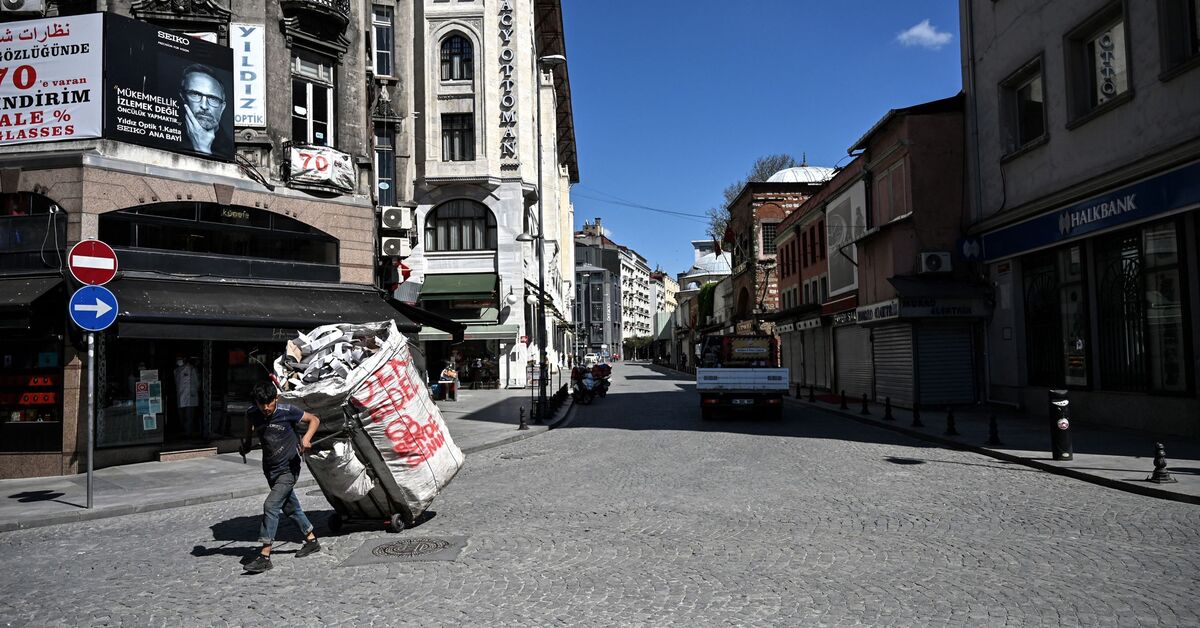Hundreds of informal recycling workers in Istanbul have been detained and many face deportation after recent police raids that critics say target migrants in particular.
Recyclable waste collectors are a common sight on the streets of Turkey’s cities and towns as they drag large hand-pulled carts and sift through garbage bins for plastic, paper and cardboard.
In a country where municipal recycling rates are among the lowest in Europe, many see their work as an important part in helping Turkey reach environmental goals.
On Thursday, dawn raids at 36 sites in Sancaktepe, a district in Istanbul’s Asian side, saw riot and special operations police deployed alongside municipal staff.
Waste-sorting sites were demolished and collection carts confiscated while media reports said “many” foreign nationals were detained and sent to a nearby migrant “collection center.” They are suspected of having entered Turkey illegally.
Earlier police operations in other parts of the city saw some 200 people detained in Atasehir on Wednesday, with 78 facing deportation. On Monday, 33 foreigners were handed over to the migration authorities for removal after a raid in Umraniye, according to a statement by the Istanbul governor’s office.
Many of the detainees were believed to be Afghans. An estimated 300,000 Afghans live in Turkey, making up the second largest migrant group after 3.7 million Syrians.
“This is a sector of irregular labor, and those Afghans, Syrians and Pakistanis working in it are the lowest in the pecking order,” said Dogus Simsek, assistant professor at Kingston University London, whose research focuses on migrant and refugee issues. “They do it while risking frequent detention by the Turkish police and with the threat of deportation hanging over them.”
The raids follow an announcement by Governor Ali Yerlikaya’s office in August that unauthorized and unlicensed waste collection had led to unregistered employment as well as “environmental and public health problems”.
Mahmut Aytar, an Istanbul waste worker, highlighted the public service provided by recycling workers and called for dialogue rather than penalties that victimize the poorest members of society.
“We’re doing this job, which is the only job we can find to live with dignity without stealing or beating, without begging from anyone. Our earnings are not unjustified, as the governor’s office claims, but gained through sweat,” he said in a statement last month. “Our poverty is in our pockets, but our hearts are rich enough to share bread with the immigrant, the Roma, the Kurd and the Turk.”
Raids that have scooped up migrants working in Istanbul’s recycling industry predate the governor’s declaration. At the start of August, some 200 Afghans, Pakistanis and Bangladeshis were detained in Bahcelievler, according to reports.
Unregulated recycling collectors, including many young children, work long hours hauling large sacks on wheeled metal frames.
They can earn up to 100 Turkish liras a day, or less than $12, according to the weight of waste they collect. They receive no health or social benefits and, like other casual workers, have been especially hard-hit by coronavirus restrictions over the past 18 months. They have also suffered as the economy falters and inflation nudges towards 20 percent.
The material they collect is sold to private recycling firms or direct to factories, with the street collectors seeing little of the profit.
Ayse Surucu, a lawmaker for the opposition Peoples’ Democratic Party (HDP), on Wednesday lodged parliamentary questions asking if the workers were being targeted to clear the way for a private company to take over collections.
Anti-migrant sentiment peaked over the summer amid reports of large groups of Afghans crossing Turkey’s eastern border with Iran. Rioting in Ankara’s Altindag district in August saw mobs attacking Syrian homes and shops.
“Targeting refugees and migrants isn’t anything new and isn’t specific to Turkey,” said Simsek. “But xenophobic remarks and actions by those in power are ruining the lives of refugees, who are held responsible for anything that goes wrong in the country. It legitimizes a racist discourse.”
Even migrants with official documentation rarely have permission to work in legitimate businesses. “How would they survive if they don’t [collect recyclables]?” said Simsek. “They have no work permit to do anything else. There are no alternatives other than begging or crime. The government has created no space for them to enter the labor market legally.”
Source:Al-Monitor
***Show us some LOVE by sharing it!***



